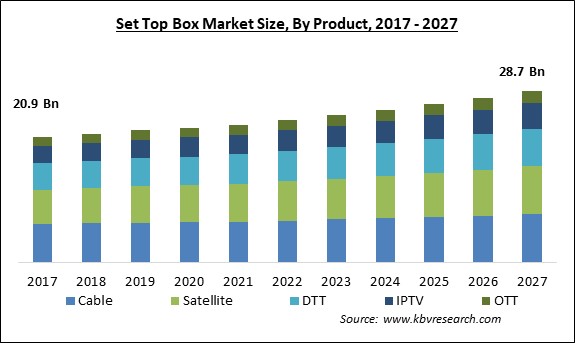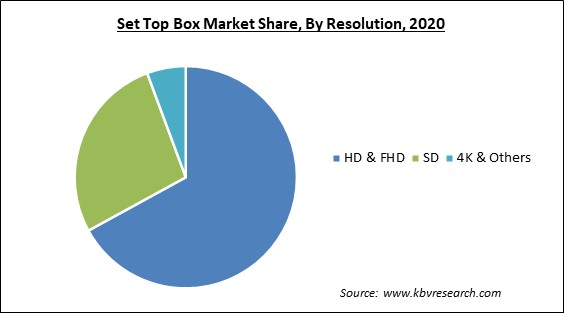The Global Set Top Box Market size is expected to reach $28.7 billion by 2027, rising at a market growth of 3.7% CAGR during the forecast period.
A set-top box (STB), also referred to as a set-top unit, is a hardware equipment which receives, deciphers and displays signals from digital television (DTV) broadcasts on a television. It is essential for digital broadcasts to be received by television viewers who have conventional television sets. Cable, satellite, and over-the-air (OTA) television systems all use it. Furthermore, a STB can include a web browser, RAM, an MPEG decoder chip, and an operating system, which coordinates access to files, programs, interfaces, and services. It can also handle more complicated tasks like video conferencing, home networking, video-on-demand, and IP telephony.
The STB market has its origins in the Table box legacy equipment, which allows a user to interact with the device via a hand-held remote control to select from a wide range of analogue television channels. As networks and service providers added more digital channels, satellite broadcast services, internet access, and other alternatives over time; the STB was introduced to the market to accommodate all of these new channels and services, which were mostly brought about by technological developments. The growth of digital consumer services has fast transformed the STB into a multipurpose device in recent years. The transmission and reception of high-quality video is now possible due to the introduction of digital television and high-definition television.
Digital transmissions of today require the use of all three major media: cable, terrestrial antenna and satellite. Each medium has its unique transmission, reception, and error-correction scheme. Previously, communication between the service provider and the STB was unidirectional, and the STB's output stage was an analogue television. It now supports historic functions while also providing a bi-directional communication channel with the service provider and generating a digital television signal for modern televisions. Controlling household appliances, using the television as a display monitor, and using a data modem to send control orders from the Set-Top Box back to the service provider are all intended functionalities of an STB. Modern digital STB devices are equipped with strong microprocessors and complex hardware in order to accomplish these enhanced functionalities.
The demand for STBs has grown dramatically and as the number of units sold has climbed and the price per unit has reduced. As a consequence, low-cost, higher-performing STBs have seen tremendous market expansion. Cable operators throughout the world have continued to place a high demand on digital cable STBs for their HD quality and interactive TV services capabilities. STBs come equipped with more silicon chips or have greater capacity silicon chips fitted to improve performance. New rivals take use of the opportunities presented by the market's diverse demands, such as supplying digital HD STBs at low prices in huge quantities.

The media industry is one of the industries undergoing a seismic shift, mostly due to the progress and integration of digital technologies following the onset of the COVID-19 pandemic. As a consequence, major businesses are focusing on implementing cutting-edge technologies to replace traditional settings. Due to being stuck at home during government mandated lockdowns, individual have turned to television for their entertainment and leisure. This reliance on television entertainment has further fueled the demand for media and entertainment services. Over the projected period, these shifting patterns are expected to fuel the rise of VoD and OTT usage and enable significant revenue creation. Due to the temporary closures of offline stores as a result of the COVID-19 pandemic, consumers' attention has switched to internet sales channels.
On-demand programming is available via pay-tv providers. On-demand requests understandably do add up to one's monthly fee. Although one can watch a greater selection of content on their smart TV with the help of a smart TV box, with significantly less complications. There are streaming servicing applications which provide its users with entertaining and exciting content. The consumer is empowered also to view all of the information on a single television screen. The viewers may also change channels without having to go through the hassle of looking for the remote every time. The best thing about a smart TV box is that a consumer may watch programming from both national and local broadcasting companies. Aside from that, users can watch content from a variety of overseas channels.
In comparison to the expense of long-term Cable TV service, the cost of an Android TV box is significantly lower. When all of the functions of an Android set-top box are considered, the price difference appears to be significant. Smart TVs are causing a stir in the TV market these days as, despite being televisions, they effectively have Android capabilities. One might have gotten a great deal on a top-of-the-line TV just few years ago when costly panels didn't have smart features. So, instead of spending a lot of money on a new smart TV, anyone can just get an Android TV Box, which will give their older TV the same features as a newer and smarter Android TV. Digital video recorder (DVR) capabilities are available on cable and satellite set-top boxes, allowing consumers to watch material at their leisure.
Smart TV set-top boxes tend to be a little slower than regular smart televisions. That's because, in comparison to a regular smart TV, cheaper Android TV boxes have smaller and slower processors, which take longer to process certain functions. Hence, customers who do not mind spending a little extra on a smart television often tend to avoid buying a regular television and equipping it with a smart set-top box. These set-top boxes are problematic not merely in terms of the quantity of energy they require, but also in terms of how that juice is used. In a recent assessment, almost all set-top boxes utilized nearly as much power while no programs were being recorded or viewed as when they were being used.

Based on Product, the market is segmented into Cable, Satellite, DTT, IPTV, and OTT. Cable STBs acquired the largest revenue share in the set-top box market in 2020. Over the last decade, the cable segment has dominated the market due to widespread adoption of cable STBs in developing nations across Asia Pacific. Government has legally mandated the adoption set-top boxes in many countries. This along with the other advantages of cable TV like improved channel carrying capacity, are pushing product demand higher. The influence of cable TV among the masses have motivated cable providers to enhance their technology and service offerings.
Based on Resolution, the market is segmented into HD & FHD, SD, 4K & Others. The 4K and above segment procured a significant revenue share of the set-top box market in 2020. This market has grown rapidly in the recent times due to an increasing demand for high-resolution content and vivid image quality. The expansion of the market is likely to be aided by a legal environment that favors the installation of set-top boxes, as well as large-scale digitization schemes being pursued in several nations. Government agencies in the United States, such as the Federal Communications Commission (FCC), are pursuing positive efforts to encourage third-party STB producers, resulting in new growth prospects for 4K STB manufacturers. The 4K and above category is expected to grow rapidly in the Asia Pacific region, owing to the presence of multiple low-cost STB manufacturers in countries like Taiwan, China, and South Korea.
| Report Attribute | Details |
|---|---|
| Market size value in 2020 | USD 22.5 Billion |
| Market size forecast in 2027 | USD 28.7 Billion |
| Base Year | 2020 |
| Historical Period | 2017 to 2019 |
| Forecast Period | 2021 to 2027 |
| Revenue Growth Rate | CAGR of 3.7% from 2021 to 2027 |
| Number of Pages | 164 |
| Number of Tables | 280 |
| Report coverage | Market Trends, Revenue Estimation and Forecast, Segmentation Analysis, Regional and Country Breakdown, Companies Strategic Developments, Company Profiling |
| Segments covered | Product, Resolution, Region |
| Country scope | US, Canada, Mexico, Germany, UK, France, Russia, Spain, Italy, China, Japan, India, South Korea, Singapore, Malaysia, Brazil, Argentina, UAE, Saudi Arabia, South Africa, Nigeria |
| Growth Drivers |
|
| Restraints |
|
Based on Regions, the market is segmented into North America, Europe, Asia Pacific, and Latin America, Middle East & Africa. The Asia pacific region accounted for the largest revenue share in the set-top box market in 2020. The increased consumption of media and entertainment material, particularly among the region's expanding middle-class population, bodes well for regional market growth. The product demand is expected to be driven by rising public awareness of technologically advanced products and the benefits offered by latest devices in terms of features, quality, and reasonable pricing when compared to traditional set-top boxes. The market's growth is likely to be influenced positively by the increasing popularity of OTT media services. As part of their efforts to cement their position in the market, many established producers in Asia Pacific, such as Kaonmedia Co. Ltd. and Huawei, are rigorously prioritizing the assimilation of latest technologies, such as motion sensors, Bluetooth, and Virtual Reality (VR), into their products.
Free Valuable Insights: Global Set Top Box Market size to reach USD 28.7 Billion by 2027
The market research report covers the analysis of key stake holders of the market. Key companies profiled in the report include LG CNS Co., Ltd., Advanced Digital Broadcast SA, Shenzhen Cozhou Electronics Co., Ltd., EchoStar Corporation, Kaonmedia Co., Ltd., Sagemcom Broadband SAS, Technicolor SA, CommScope Holding Company, Inc., Samsung Electronics Co., Ltd., and Huawei Technologies Co., Ltd.
By Product
By Resolution
By Geography
The global set top box market size is expected to reach $28.7 billion by 2027.
Availability of a wide range of content are increasing are driving the market in coming years, however, smart TV Boxes Are technologically inferior limited the growth of the market.
LG CNS Co., Ltd., Advanced Digital Broadcast SA, Shenzhen Cozhou Electronics Co., Ltd., EchoStar Corporation, Kaonmedia Co., Ltd., Sagemcom Broadband SAS, Technicolor SA, CommScope Holding Company, Inc., Samsung Electronics Co., Ltd., and Huawei Technologies Co., Ltd.
Yes, Due to being stuck at home during government mandated lockdowns, individual have turned to television for their entertainment and leisure. This reliance on television entertainment has further fueled the demand for media and entertainment services.
The HD & FHD segment acquired maximum revenue share in the Global Set Top Box Market by Resolution in 2020, thereby, achieving a market value of $19.7 billion by 2027.
The Asia Pacific is the fastest growing region in the Global Set Top Box Market by Region in 2020, and would continue to be a dominant market till 2027.
Our team of dedicated experts can provide you with attractive expansion opportunities for your business.

